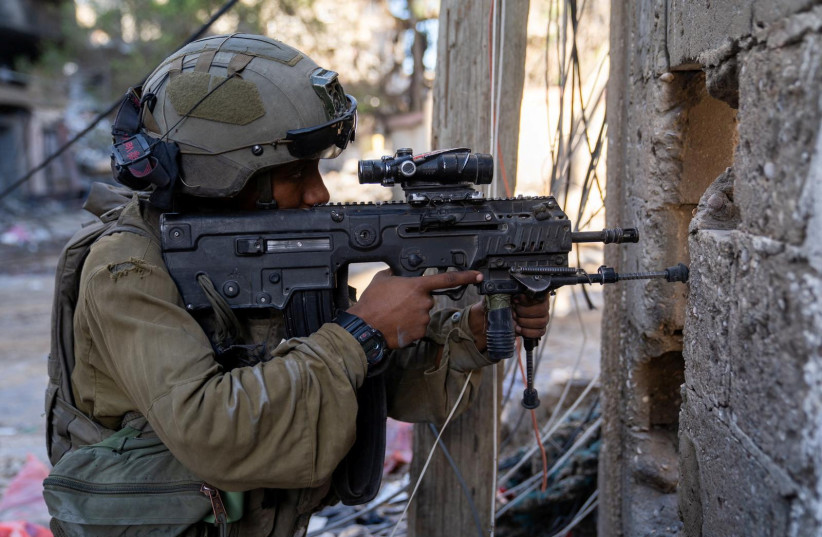One of the many things Israel lost on October 7, in addition to the unfathomable loss of life and sense of security, was faith in the nation’s security services.
Up until October 7, if the IDF’s chief of staff said that Israel was prepared to deal with any threat on all fronts, most Israelis believed him. If the head of military intelligence said that in his assessment, both Hamas and Hezbollah were not interested in a major war at this time, most Israelis slept a little sounder. And if the head of the Israel Security Agency (Shin Bet) said that his organization had thwarted hundreds of terror attacks so far this year, most Israelis marveled at its intelligence capabilities.
But then 3,000 Hamas terrorists stormed across the border on October 7, without anyone ringing the alarm beforehand – or, more precisely, without the top brass paying attention to the alarm bells that were ringing – and all of a sudden, all that trust and faith in the country’s vaunted security services took a huge hit.
Over the last few years, the public’s trust in various institutions – from the Supreme Court to the Knesset, to the police and the media – has steadily declined. Annual polls carried out by the Israel Democracy Institute bear this out.
However, the one institution that increasingly cynical Israelis continued to have faith in, to place their trust in, was the IDF.
Then October 7 came and created a crisis of faith in the IDF and intelligence and security services as well.

October 7 took away people's faith. October 8, 9, 10 have restored some of it
To a large degree, however, what happened on October 8, 9, 10, and every day since has restored some of that faith – at least in the IDF’s ability to fight.
Much as was the case 50 years ago, at the outbreak of the Yom Kippur War, the military leadership failed, but the soldiers demonstrated tremendous courage, and valor, and skill on the battlefield that restored faith among the public in the IDF’s ability to defend the country.
There remains, however, a loss of faith in the top brass. And this loss of faith presents challenges exactly at a time like today – when a hostage deal with Hamas is to be carried out.
However wonderful the prospect of bringing home 50 of the 240 hostages so cruelly held by Hamas, the deal presents Israel with real security challenges.
After certain alterations were made to the deal, the defense establishment – including Defense Minister Yoav Gallant, Chief of Staff Lt.-Gen Herzi Halevi, and Shin Bet head Ronen Bar – all endorsed it, essentially saying, “Trust us, we can deal with any of the security issues that may arise as a result.”
And those security challenges are considerable.
They include Hamas using the four-day temporary ceasefire to regroup, reassess, and refuel, and be better able to fight IDF soldiers when the ceasefire ends. It includes finding alternatives to provide real-time intelligence inside Gaza during those six-hour periods each day when Israel has agreed to halt aerial surveillance of the area. And it includes being able to prevent the terrorists that Israel will release as part of the deal from killing Jews again.
“We can handle it,” is the chorus coming from the country’s security establishment.
Prior to October 7, that type of chorus would have been reassuring. But now?
As Yediot Ahronot military correspondent Yossi Yehoshua wrote on Wednesday: “The same senior staff that was responsible for the worst debacle in the history of the state is pushing this agreement, one which it is calling ‘a deal of no choice’... It is clear that without the unequivocal support of the defense establishment, there would not be an agreement.”
Yehoshua’s point is simple: Why blindly trust the judgment now of the top brass that failed so spectacularly on October 7?
If military intelligence failed so miserably in reading Hamas’s intentions prior to October 7, why think that it can do a better job now? What reason is there to think that military intelligence is better able now to decipher the intentions of Hamas leader Yahya Sinwar than it was seven weeks ago?
One of the problematic parts of this deal for Israel is its agreement that no aerial surveillance be conducted in Gaza for six hours a day. One senior defense official was quoted in the media as saying that there are other alternatives and that the IDF will not be left “blind” during these periods.
Prior to October 7, that might have been reassuring. Today, a bit less so.
Unlike Prime Minister Benjamin Netanyahu, the chief of staff, the head of military intelligence, the head of the IDF’s southern command, and the Shin Bet chief all took personal responsibility soon after the October 7 attack for the debacle. That is the start of regaining public faith.
After the war, as painful as it may be, the top brass – men with considerable merits and tremendous accomplishments – will have to be replaced. The hostage agreement shows why. While the top security brass says to the public, “Trust us, we can deal with this,” many in the public ask, “Can you?”
The heart wants to trust them, just like in days past.
But in the post-October 7 world, the mind doubts their assessments. How can one trust the judgments of those who failed so profoundly on October 7?
And what is true of the military echelon is certainly true of the political echelon as well – this trust deficit must be redressed.
